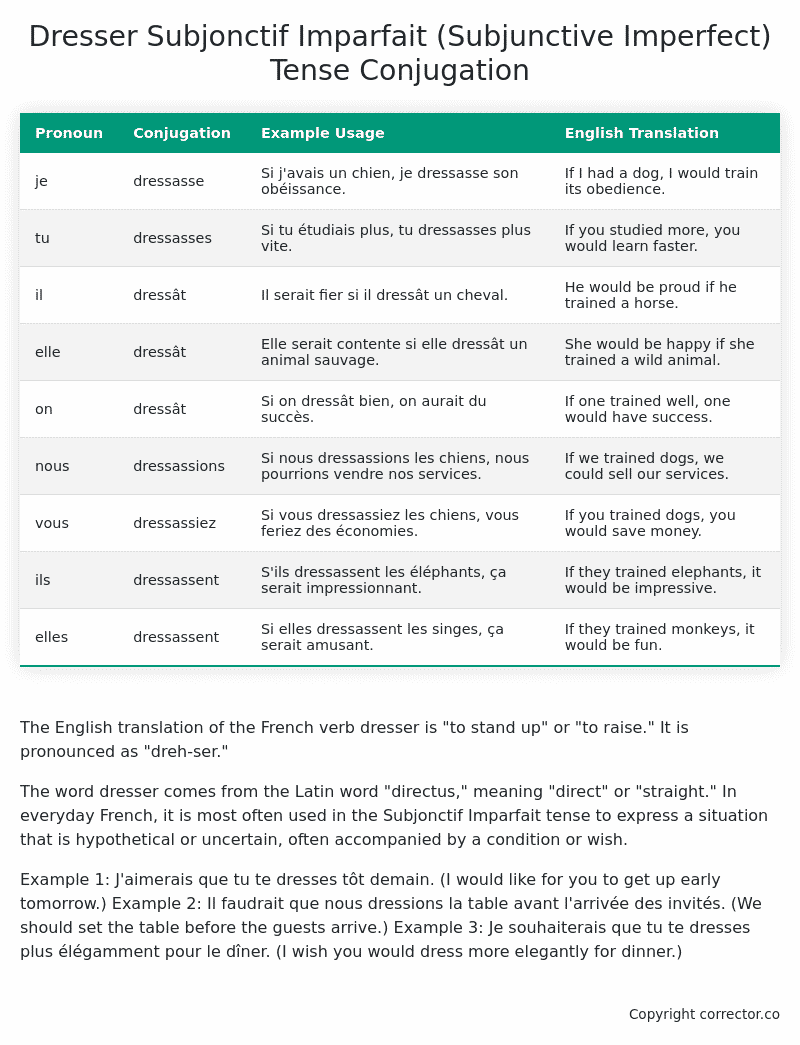Subjonctif Imparfait (Subjunctive Imperfect) Tense Conjugation of the French Verb dresser
Introduction to the verb dresser
The English translation of the French verb dresser is “to stand up” or “to raise.” It is pronounced as “dreh-ser.”
The word dresser comes from the Latin word “directus,” meaning “direct” or “straight.” In everyday French, it is most often used in the Subjonctif Imparfait tense to express a situation that is hypothetical or uncertain, often accompanied by a condition or wish.
Example 1: J’aimerais que tu te dresses tôt demain. (I would like for you to get up early tomorrow.)
Example 2: Il faudrait que nous dressions la table avant l’arrivée des invités. (We should set the table before the guests arrive.)
Example 3: Je souhaiterais que tu te dresses plus élégamment pour le dîner. (I wish you would dress more elegantly for dinner.)
Table of the Subjonctif Imparfait (Subjunctive Imperfect) Tense Conjugation of dresser
| Pronoun | Conjugation | Example Usage | English Translation |
|---|---|---|---|
| je | dressasse | Si j’avais un chien, je dressasse son obéissance. | If I had a dog, I would train its obedience. |
| tu | dressasses | Si tu étudiais plus, tu dressasses plus vite. | If you studied more, you would learn faster. |
| il | dressât | Il serait fier si il dressât un cheval. | He would be proud if he trained a horse. |
| elle | dressât | Elle serait contente si elle dressât un animal sauvage. | She would be happy if she trained a wild animal. |
| on | dressât | Si on dressât bien, on aurait du succès. | If one trained well, one would have success. |
| nous | dressassions | Si nous dressassions les chiens, nous pourrions vendre nos services. | If we trained dogs, we could sell our services. |
| vous | dressassiez | Si vous dressassiez les chiens, vous feriez des économies. | If you trained dogs, you would save money. |
| ils | dressassent | S’ils dressassent les éléphants, ça serait impressionnant. | If they trained elephants, it would be impressive. |
| elles | dressassent | Si elles dressassent les singes, ça serait amusant. | If they trained monkeys, it would be fun. |
Other Conjugations for Dresser.
Le Present (Present Tense) Conjugation of the French Verb dresser
Imparfait (Imperfect) Tense Conjugation of the French Verb dresser
Passé Simple (Simple Past) Tense Conjugation of the French Verb dresser
Passé Composé (Present Perfect) Tense Conjugation of the French Verb dresser
Futur Simple (Simple Future) Tense Conjugation of the French Verb dresser
Futur Proche (Near Future) Tense Conjugation of the French Verb dresser
Plus-que-parfait (Pluperfect) Tense Conjugation of the French Verb dresser
Passé Antérieur (Past Anterior) Tense Conjugation of the French Verb dresser
Futur Antérieur (Future Anterior) Tense Conjugation of the French Verb dresser
Subjonctif Présent (Subjunctive Present) Tense Conjugation of the French Verb dresser
Subjonctif Passé (Subjunctive Past) Tense Conjugation of the French Verb dresser
Subjonctif Imparfait (Subjunctive Imperfect) Tense Conjugation of the French Verb dresser (this article)
Subjonctif Plus-que-parfait (Subjunctive Pluperfect) Tense Conjugation of the French Verb dresser
Conditionnel Présent (Conditional Present) Tense Conjugation of the French Verb dresser
Conditionnel Passé (Conditional Past) Tense Conjugation of the French Verb dresser
L’impératif Présent (Imperative Present) Tense Conjugation of the French Verb dresser
L’infinitif Présent (Infinitive Present) Tense Conjugation of the French Verb dresser
Struggling with French verbs or the language in general? Why not use our free French Grammar Checker – no registration required!
Get a FREE Download Study Sheet of this Conjugation 🔥
Simply right click the image below, click “save image” and get your free reference for the dresser Subjonctif Imparfait tense conjugation!

Dresser – About the French Subjonctif Imparfait (Subjunctive Imperfect) Tense
Formation
Common Everyday Usage Patterns
Interactions with Other Tenses
Subjonctif Présent
Indicatif Passé Composé
Conditional
Conditional Perfect
Summary
I hope you enjoyed this article on the verb dresser. Still in a learning mood? Check out another TOTALLY random French verb conjugation!


